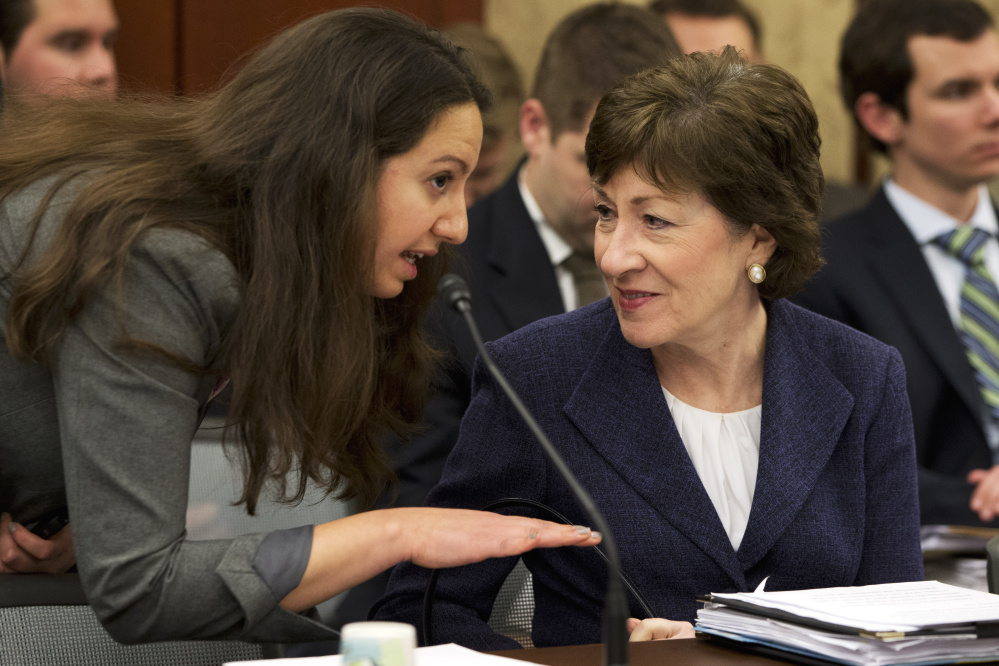WASHINGTON — The leaders of a Senate panel are condemning four companies for aggressively increasing prices for prescription drugs. They say the companies have exploited a system lacking in competition to hike prices for critically needed medicines.
An investigation by the Senate Special Committee on Aging focuses on Turing Pharmaceuticals, Valeant Pharmaceuticals, Retrophin Inc. and Rodelis Therapeutics. The first two faced especially harsh criticism.
“The Turing and Valeant price spikes have been egregious,” Sen. Susan Collins, the Maine Republican who heads the panel, said at a hearing Wednesday.
Collins added that like those two companies, Retrophin and Rodelis also bought the rights to brand-name drugs whose patents had expired and then hiked their prices.
Public outrage boiled over this fall after news that Turing increased by more than 5,000 percent the price of Daraprim, a drug used to treat a life-threatening infection, jacking it up from $13.50 to $750 per pill.
Daraprim, a 62-year-old drug whose patent expired decades ago, is the only approved treatment for a rare parasitic infection called toxoplasmosis that mainly strikes pregnant women, cancer patients and AIDS patients.
Drug-price spikes have occurred with increasing frequency as competition decreases in the pharmaceutical industry.
The Senate panel, which began the investigation last month, is examining the price increases for prescription drugs that are no longer protected by patents, and their impact on patients who need the medications.
The lawmakers also are considering how government policies and regulations may be worsening the problem.
The panel, which oversees Social Security, Medicare and other programs for seniors, doesn’t have authority to write laws but often investigates industries that market to seniors.
The committee had requested documents and information from the four companies. Valeant, a Canadian company based in Quebec, already had been under investigation by several members of Congress for its business strategy, and Turing and Valeant have received subpoenas from U.S. federal prosecutors seeking information about drug pricing and other policies.
In a statement Wednesday, Valeant said that because it sells hundreds of prescription and non-prescription drugs, “broad conclusions about the company’s pricing cannot be drawn from any one drug or set of drugs.”
“We set prices based on a number of factors, including the cost of the development or acquisition of a drug, the availability of substitutes or generics, and the benefits it offers versus alternative treatments that might be more costly,” Valeant said.
A spokesman for Turing said the company was declining to comment on the hearing. Turing, with offices in New York City and Switzerland, had said in reference to the Senate panel’s investigation that it looked forward “to having an open and honest dialogue about drug pricing.”
Retrophin, based in San Diego, said it shares the committee’s “commitment to ensuring that patients have ready and affordable access to life-enhancing and life-saving treatments.” The company said in a statement it makes “significant investments” to improve access to its treatments and in research and development for promising drugs to treat rare diseases.
Representatives of Rodelis didn’t immediately return telephone calls seeking comment.
After the outcry in September over Daraprim, Turing CEO Martin Shkreli said the company would reduce the $750-a-pill price. Last month, however, Turing reneged on its pledge. Instead, the company is reducing what it charges hospitals for Daraprim by as much as 50 percent. Most patients’ copayments will be capped at $10 or less a month. But insurance companies will be stuck with the bulk of the tab, potentially driving up future treatment and insurance costs.
Companies generally can set the prices for approved drugs because the U.S. government doesn’t regulate medicine prices, as other countries do. The powerful pharmaceutical lobby has repeatedly fended off proposals that would cut into profits, from setting up price controls to allowing Medicare to negotiate discounts on drugs it buys for beneficiaries.
That means the primary check on medicine prices comes from buyers in bulk – insurance companies, big hospital chains and group purchasing organizations that negotiate sizable discounts off the manufacturer’s wholesale price. That happens when several companies make the same generic drug or similar brand-name drugs.
When there’s no competition, big buyers and payers have less ability to rein in prices.
The higher prices initially mainly hit people paying for the medicines out of pocket, but over time, the spikes affect the entire health system, experts say. Rising insurance premiums and deductibles, and increased taxes to fund federal health programs, can ripple through the system. As a result, patients may go without their medication, ration their use or switch to cheaper, less effective drugs.
Copy the Story LinkSend questions/comments to the editors.



Success. Please wait for the page to reload. If the page does not reload within 5 seconds, please refresh the page.
Enter your email and password to access comments.
Hi, to comment on stories you must . This profile is in addition to your subscription and website login.
Already have a commenting profile? .
Invalid username/password.
Please check your email to confirm and complete your registration.
Only subscribers are eligible to post comments. Please subscribe or login first for digital access. Here’s why.
Use the form below to reset your password. When you've submitted your account email, we will send an email with a reset code.